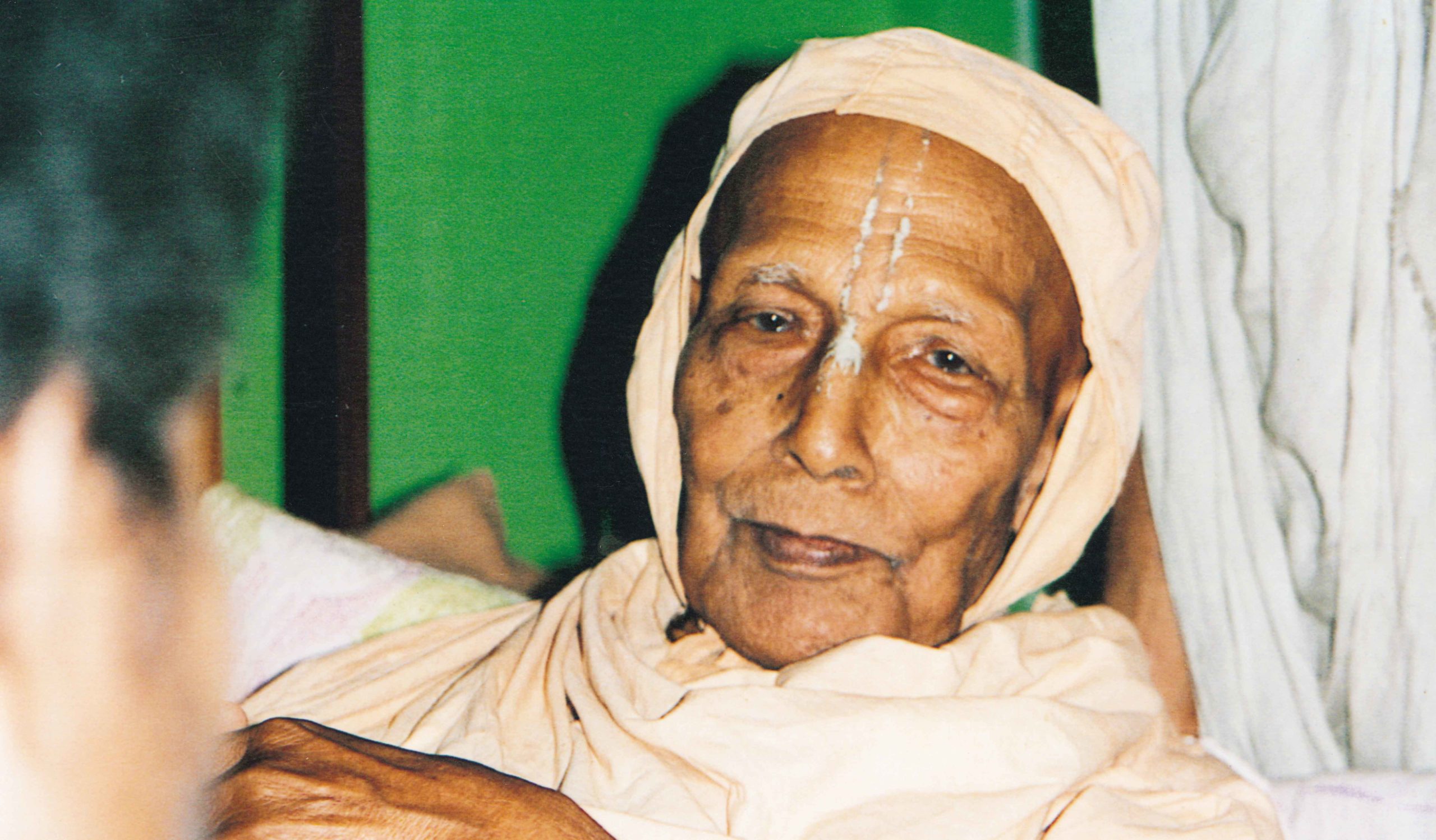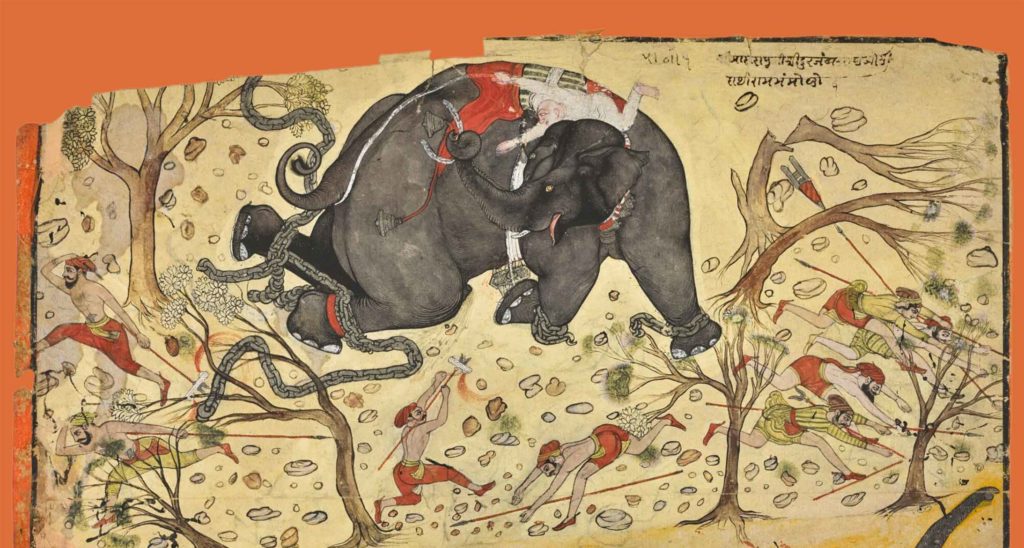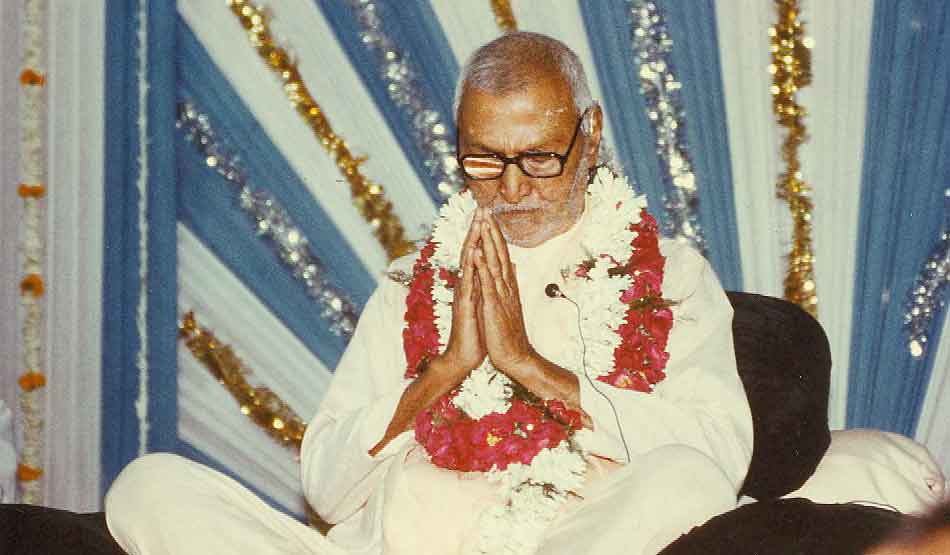Overview
This Bengali poem, 'Śrī Śrīla Gadādhara Paṇḍita Gosvāmī Prabhura
Tirobhāva Upalakṣe Sūcika' was composed by Śrīla Bhakti Pramoda Purī Gosvāmī Mahārāja and first published in The Gauḍīya, Vol.1, Issue 7th, June 1950. It was translated in English by Swami B.V. Giri and Sanātana Dāsa.
(1)
gaura-śakti gadādhara, gaura-preme gara-gara
‘prāṇa-nātha’ – virahe kātara
bhāse buka aṅkhinīre, sadā hā hutāśa kare
śūnyāyita dekhe carācara
Gadādhara, the potency of Gaura, is immersed in love for Gaurāṅga. He feels great separation from the Lord of his life. Due to this, his heart is flooded with tears from his eyes and he continuously laments, seeing the entire world as vacant.
(2)
‘pratijñā-bhaṅge’ sevā-tyāga, ei dui doṣa bhāk
haiyechilā yāṅāra premabhare
tāṅhāra viccheda vyathā, sahite śakati kothā
smarite-i parāṇa vidare
He broke his promise and renounced his service – these two faults happened on the strength of his intense love for the Lord. Where is the strength to bear such agony of separation? Just by remembering it the heart feels pain.
(3)
gaurāṅgera-nija-śakti, rādhā-bhāva mūrtimatī
paṇḍita śrī gadādhara prabhu
amāniśāra andhakāre, dubāiyā sabākāre
nitya-līlā praveśilā vibhu
Paṇḍita Śrī Gadādhara Prabhu is Śrī Gaurāṅga’s own potency and the very personification of rādhā-bhāva. His effulgence has now entered into the eternal pastimes, and everyone is immersed in the darkness of a moonless night.
(4)
nidrāhāre yatna nāi, sadā kahe kāṅhā yāi
kāṅhā pāi gaurāṅga-sundare
ekhano nilāja prāṇī, kena rahe nāhi jāni
kebā sukha cāhe bhuñjivāre
Neglecting sleep and food, he constantly laments, “Where can I find Gaurāṅga-sundara? Still this shameless living being is still surviving – why I don’t know. What happiness does he wish to taste?”
(5)
kṣaṇe kṣaṇe murchā yāya, hailā pāgalera prāya
bakṣe śire kare karāghāta
ki doṣe āmāre nātha, saṅga haite dilā vāda
kena more nāhi nilā sātha
At every instant he is swooning and has become almost mad, beating his own chest and head crying, “O my Lord, due to what fault did You remove me from Your association? Why did You not take me with You?”
(6)
kibā bale, kibā kare, kibā cāhe cāhe phire
ke varṇe se divyānmāda tāṅra
gadādhara anugata, haiyāche yāṅra cita
tiṅha bujhe kichu marma tā’ra
Whatever he does, whatever he says, wherever he moves about and looks around – who can describe his divine madness? Only one whose heart is surrendered to Śrī Gadādhara can understand a fragment of its essence.
(7)
bhāgavata-ślokākṣara, cakṣu-jala nirantara
bhāsāite premonmata haiyā
śuni’ gadāira pāṭa, gaurāṅgera prema-nāṭa
sukhe pūrṇa gopīnātha hiyā
Tears from his eyes constantly cover the verses of the Bhāgavata, due to his state of divine madness arising out of prema. Hearing Gadādhara’s recitation about the loving pastimes of Gaurāṅga, Śrī Toṭa-Gopīnātha is completely filled with happiness.
(8)
premonmata śrīnivāsa, āsi’ gadādhara pāśa
nirakhilā yabe puṅkhi-khāni
kāṅdiyā ākula hailā, punaḥ punaḥ aliṅgilā
mahā-prema-ratnākara jāni
Śrīnivāsa Ācārya, mad with divine love, came to the side of Śrī Gadādhara Paṇḍita; when he saw the sacred texts, he wept incessantly and again and again embraced him, knowing him to be a great ocean of divine love.
(9)
hena prema-nidhi gadāi, yāṅhāra tulanā nāi
sākṣāt yei rādhā-ṭhākurāṇī
tiṅha more kaile kṛpā, jāni’ guru-gaura-sevā
nāma-prema-dhane ha’ba dhanī
Gadāi is such an incomparable ocean of prema. He is Rādhā Ṭhākurāṇī Herself. If you are merciful unto me, then I will realize the service of Śrī Śrī Guru-Gaurāṅga. I will be enriched by the wealth of the love of Holy Name.
(10)
bahya veśa bhūṣā heri’ vaiṣṇava cinite nāri
śikhailā ādarśa ācari
puṇḍarīka-sthāne bhikṣā, kari nilā mantra-dīkṣā
yāhā śuni aparādhā tari
One cannot recognise a Vaiṣṇava by his external appearance and dress – as an ācārya, he taught us this by his own example and begged to receive mantra-dīkṣā from Śrīla Puṇḍarīka Vidyānidhi. By hearing this pastime, one can be rid of offences.
(11)
gadāira gaura-prema, yena jāmbu-nada hema
ki bujhiba muñi arvācīna
viṣaye-āsakta cita, kāma-krodhe sadaāhata
kṛṣṇendriya-prīti-vāñcā hīna
The gaura-prema of Gadāi is like that of the Jāmbu River that flows through Jambudvīpa. What can I understand with my immature intellect? My mind is attached to material possessions; it is always being deceived by lust and anger and it is devoid of any desire to please Kṛṣṇa’s senses.
(12)
gopīnātha padmāsane, basi ratna-siṅghāsane
yāṅra sevā layena satata
hena gadādhara sevā, nā karile niśi dibā
bala kise haibeka hita
Toṭa-Gopīnātha, sitting in padmāsana on a jewelled throne, is always accepting the service of Śrī Gadādhara. If one does not serve Gadādhara day and night, what else will give any benefit?
(13)
gadādhara-prāṇa-nātha, hana mora gopīnātha
gadāi-kṛpāya tāṅre pāi
tiṇha kṛpā kaile more, gopīnātha cāre phire
tiṅha vinu āra gati nāi
The Lord of Gadādhara’s life is my Gopīnātha. By the mercy of Gadāi, one can attain Him. O Gadādhara, if you show mercy to me, Gopīnātha will look towards me. Without you, there is no hope.
(14)
gadāi-gaurāṅga jaya rādhā-gopinātha
kṛpā kari e adhame kara ātma-sāta
All glories to Gaura-Gadādhara and Rādhā-Gopīnātha. Please be merciful to me and accept this fallen soul as Your own.
Related Articles, Songs and Prayers
- Śrī Gaura-hari Kusuma Stavāṣṭākam by Śrīla Bhakti Rakṣaka Śrīdhara Deva Gosvāmī
- Śrī Kusumañjalī (An Offering of Flowers) by Śrīla Bhakti Rakṣaka Śrīdhara Deva Gosvāmī
- Śrī Nāma Māhātmya (The Glories of the Holy Name) by Śrīla Bhakti Rakṣaka Śrīdhara Deva Gosvāmī
- Śrī Nityānanda Dvādaśakam by Śrīla Bhakti Rakṣaka Śrīdhara Deva Gosvāmī
- Śrīmad Bhaktivinoda Viraha Daśakam by Śrīla Bhakti Rakṣaka Śrīdhara Deva Gosvāmī
- Śrī Śrī Gaurasundara Āvirbhava Vāsare by Śrīla Bhakti Rakṣaka Śrīdhara Deva Gosvāmī
- ‘The Best of Thieves’ – An Illumination by Śrīla Bhakti Rakṣaka Śrīdhara Deva Gosvāmī
- Mā Muñca Pañca-daśakam (Fifteen Verses Praying Not to be Abandoned) by Śrīla Śrīdhara Deva Gosvāmī Mahārāja
- Śrīla Sarasvatī Gosvāmyāṣṭakam by Śrīla Śrīdhara Deva Gosvāmī Mahārāja
- Vṛndāvane Bhajana (Worship in Vṛndāvana) by Śrīla A.C. Bhaktivedānta Swami Prabhupāda
- Vaiśiṣṭyāṣṭaka (Eight Stanzas of Significance) by Śrīla A.C. Bhaktivedānta Swami Prabhupāda
- Svasti No Gaura-vidhur Dadhātu (May the Moon-like Gaura Bestow Auspiciousness) by Śrīla B.P. Purī Mahārāja
- A Prayer Composed on the Occasion of the Disappearance of Śrīla Gadādhara Paṇḍita by Śrīla Bhakti Pramoda Purī Gosvāmī
- Śrī Śrī Gaura Gopāla Praśasti (In Praise of Śrī Śrī Gaura Gopāla) by Śrīla Bhakti Pramoda Purī Gosvāmī
- Viraha-Gītikā (A Song of Separation) by Śrīla Bhakti Pramoda Purī Mahārāja
- Jaya Rādhā-Mādhava by Śrīla Bhakti Gaurava Narasiṅgha Mahārāja
- Purport to Śrīla Prabhupāda-līlā Smaraṇa-Maṅgala Stotram by Śrīla Bhakti Gaurava Narasiṅgha Mahārāja
- Purī Mahārāja’s Praṇāma Mantra by Śrīla Bhakti Gaurava Narasiṅgha Mahārāja
- Śrī Guru-viraha Ṣaṭakam – Six Verses in Separation from Śrī Guru by Swami B.V. Giri
- Śrī Guru Praṇāma Anuvākya – An Explanation of Śrīla Guru Mahārāja’s Praṇāma Mantra by Swami B.V. Giri
Further Reading from the Bhaktivinoda Institute
- Gītā-mālā (A Garland of Songs) by Śrīla Bhaktivinoda Ṭhākura (Songbook)
- Kalyāṇa Kalpataru (‘The auspicious Desire Tree’) by Śrīla Bhaktivinoda Ṭhākura (Songbook)
- Śaraṇāgati (Surrendered to the Lord’s Shelter) by Śrīla Bhaktivinoda Ṭhākura (Songbook)
- Gītāvalī (A Collection of Songs) by Śrīla Bhaktivinoda Ṭhākura (Songbook)
- Bāula Saṅgīta by Śrīla Bhaktivinoda Ṭhākura (Songbook)
- Sevā Lālasā (Hankering for Service) by Śrīla Bhaktivinoda Ṭhākura (Songbook)
- Śrī Godruma-candra Bhajanopadeśa by Śrīla Bhaktivinoda Ṭhākura
- Śrī Kṛṣṇacandra by Śrīla Bhaktivinoda Ṭhākura
- Śrī Gīta Govinda Introduction by Śrīla Bhaktivinoda Ṭhākura
- Poems by Śrīla Bhaktivinoda Ṭhākura
Prema Dhāma Deva Stotram with the Narasiṅgha Sevaka Commentary – Verses 61-65
In verses 61 to 65 of 'Prema Dhāma Deva Stotram', Śrīla Śrīdhara Mahārāja narrates the pastime of Śrī Caitanya at Caṭaka Parvata In Purī and explains how the scriptures produced by Brahmā and Śiva are ultimately searching for the personality of Mahāprabhu who is merciful too all jīvas, no matter what their social position.
Prabhupāda Śrīla Sarasvatī Ṭhākura’s Visit to Ayodhyā
With the forthcoming observance of Śrī Rāma Navamī, we present 'Prabhupāda Śrīla Sarasvatī Ṭhākura’s Visit to Ayodhyā' written by Śrīla Bhaktisiddhānta Sarasvatī Ṭhākura Prabhupāda from The Gaudīyā magazine, Vol 3. Issue 21/ In December 1924, after visiting Benares and Prāyāga, Sarasvatī Ṭhākura visited the birth-site of Śrī Rāmācandra in Ayodhyā.
Śaraṇāgati – The Only Path to Auspiciousness
In this article, 'Śaraṇāgati - The Only Path to Auspiciousness', Dhīra Lalitā Dāsī analyses the process of śaraṇāgati (surrender) beginning with śraddhā (faith). She also discusses the role of śāstra and the Vaiṣṇava in connection with surrender.
Ātma Samīkṣā – The Value of Introspection
In this article, "Ātma Samīkṣā – The Value of Introspection" Kalki Dāsa highlights the importance of introspection in the life of a devotee and especially in relation to the worldly environment that surrounds us. He also explains how transcendental sound influences our capacity to introspect.
Prema Dhāma Deva Stotram with the Narasiṅgha Sevaka Commentary – Verses 61-65
In verses 61 to 65 of 'Prema Dhāma Deva Stotram', Śrīla Śrīdhara Mahārāja narrates the pastime of Śrī Caitanya at Caṭaka Parvata In Purī and explains how the scriptures produced by Brahmā and Śiva are ultimately searching for the personality of Mahāprabhu who is merciful too all jīvas, no matter what their social position.
Prabhupāda Śrīla Sarasvatī Ṭhākura’s Visit to Ayodhyā
With the forthcoming observance of Śrī Rāma Navamī, we present 'Prabhupāda Śrīla Sarasvatī Ṭhākura’s Visit to Ayodhyā' written by Śrīla Bhaktisiddhānta Sarasvatī Ṭhākura Prabhupāda from The Gaudīyā magazine, Vol 3. Issue 21/ In December 1924, after visiting Benares and Prāyāga, Sarasvatī Ṭhākura visited the birth-site of Śrī Rāmācandra in Ayodhyā.
Śaraṇāgati – The Only Path to Auspiciousness
In this article, 'Śaraṇāgati - The Only Path to Auspiciousness', Dhīra Lalitā Dāsī analyses the process of śaraṇāgati (surrender) beginning with śraddhā (faith). She also discusses the role of śāstra and the Vaiṣṇava in connection with surrender.
Ātma Samīkṣā – The Value of Introspection
In this article, "Ātma Samīkṣā – The Value of Introspection" Kalki Dāsa highlights the importance of introspection in the life of a devotee and especially in relation to the worldly environment that surrounds us. He also explains how transcendental sound influences our capacity to introspect.








